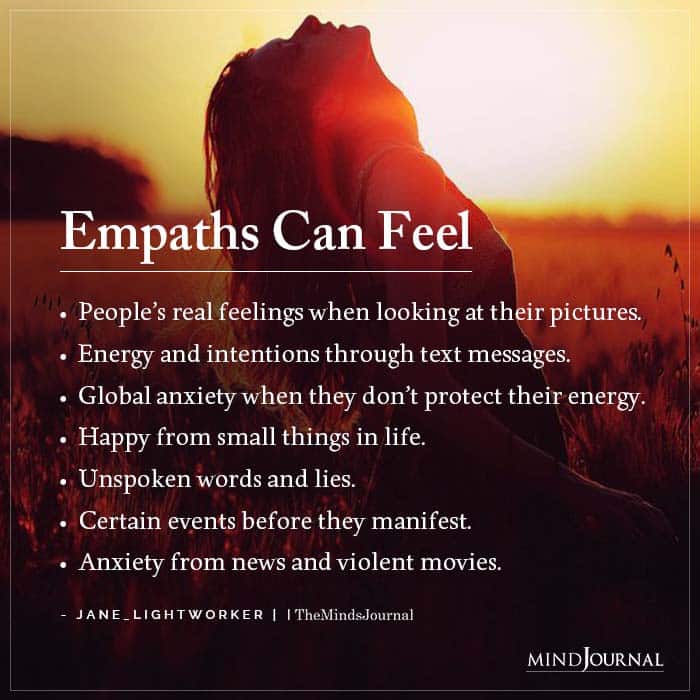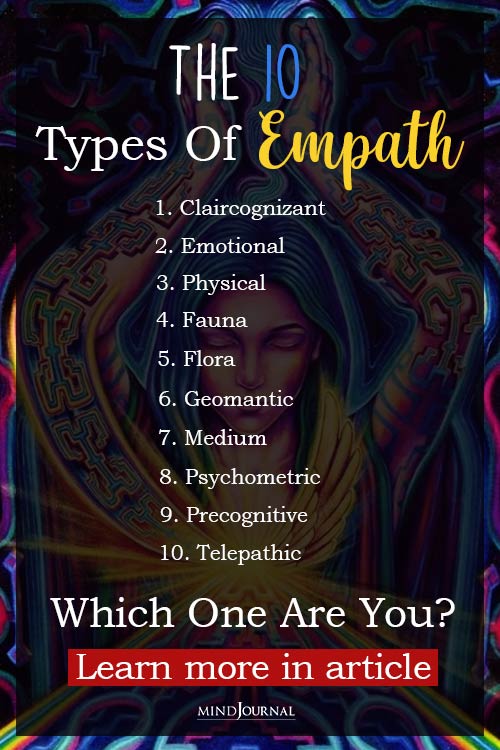Did you know that there are different types of empaths, and each and every one of them has their own powers and qualities that make them powerful and compassionate at the same time?
Empowered by sensitivity? It sounds strange, doesn’t it? Sort of ironic, contradictive, and even mutually exclusive.
How can you be empowered by something so soft, subtle, and delicate, in a world full of hard, overpowering, and loud people? Indeed, many of us Empaths get trampled, used, thrown around, and taken advantage of. But we have a secret.
Deep down inside, beyond the veil of our superficial appearances, we harbor something quiet, but powerful. Our gifts don’t dominate, tyrannize or overthrow people, but that doesn’t detract from their strength or usefulness.
If anything, our powerful but subtle gifts benefit us more in the long term, allowing us to gather emotional, psychological, and physical information from our surroundings that are often inaccessible and undisclosed to the average, unreceptive mind.
Related: 9 Reasons Why Empaths Are The Best People To Have Around
While we can’t bully, back-stab, or use brute force, we can heal, guide, protect and deeply understand the lives of the people around us. In essence, we can gather immense amounts of knowledge. And knowledge, as they say, is power.
If you would like to discover whether you are an Empath, keep reading. Also, if you would like to discover what type of Empath you are, you will discover the 10 types at the end of this article.

Are You An Empath?
If you are an Empath, you will experience a combination of some or all of the following symptoms:
- You absorb other people’s emotions like a sponge, carrying them as your own.
- When someone close to you is physically ill, you can feel this physical pain in your body.
- You often suffer from physical or mental fatigue and tiredness.
- You find Solitude immensely refreshing, and you require it to “recharge”.
- You often experience many mood swings or emotional states throughout the day.
- Witnessing violence or cruelty is unbearable to you.
- You are a very good listener.
- People often come to you with their problems.
- Animals and children are attracted to you.
- You are caring and nurturing by nature.
- You are hyper-aware of the physical environment, e.g. smell, taste, sight, touch, hearing, etc.
- You can’t stand interpersonal conflict.
- Crowded places are very overwhelming and draining to you.
10 Types Of Empath
While being an Empath can have many positives and benefits, it can also weigh us down heavily with confusion, disorientation, and anxiety. That is why it’s important to put a name to what we individually experience to better understand ourselves, and identify others who share the same abilities as us.
For this reason, I have included below a list, and a small description, of each type of Empath. By understanding who you are, what gifts you possess, and where you stand in life, you will be able to begin the path of Involution.
Related: What Type of Empath Are You Based On Your Zodiac Sign
1. Claircognizant Empath
This is usually defined by the ability to simply know something needs to be done, or is true or misleading, without having any basis in logic or reason.
Often this type of Empath will just “know” when something is right to do, or not, or when someone is lying or hiding something.
2. Emotionally Receptive Empath
Most Empaths are emotionally receptive, and can physically and emotionally feel the emotions of other people before they are even expressed.
3. Physically Receptive Empath
Many Empaths are also physically receptive to other people’s illnesses and bodily pains. This often manifests itself in the Empath’s own body and can be an especially useful skill in healing.
4. Fauna Empath
This type of Empath can hear, feel and interact with animals.
5. Flora Empath
This type of Empath can communicate with plants, being able to receive physical and emotional signals.
6. Geomantic Empath
The Geomantic Empath can read the energy and signals transmitted by the earth. Many are able to feel/predict natural disasters before they occur.
Related: What Is Your Strongest Gift As An Empath? Choose A Circle To Find Out
7. Medium Empath
This type of Empath can either see, hear, or feel (or a combination of these elements) spirits, usually from deceased individuals.
8. Psychometric Empath
This manifests itself as the ability to receive information, energy, and impressions from physical objects, e.g. photographs, clothing, jewelry, utensils, etc.
9. Precognitive Empath
This type of Empath can feel the occurrence of an event or situation before it actually happens. This is usually manifested in dreams, or as physical/emotional sensations, for instance: dread, anxiety, or excitement.

10. Telepathic Empath
The ability to accurately read a person’s unexpressed thoughts is the main defining feature of the Telepathic Empath.
Being an Empath can be difficult and confusing, but with an awareness of your gifts and abilities, you can refine them and use them to guide, heal, and protect yourself and the people you love.
Related: 5 Kinds Of Psychic Empath Ability
My hopes are that the information within this article can continue to make ripples within your life. Please share with me any stories or experiences you have below. This will help all of us broaden our knowledge and understanding of what it is to be an Empath!
Want to know more about the different types of empaths? Check this video out below!
Written by Aletheia Luna Source - Lonerwolf












Leave a Reply